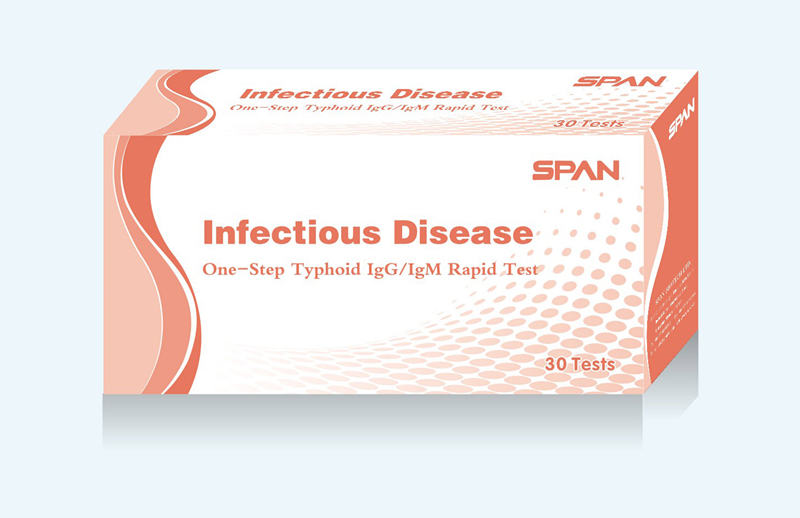Intended Use
The Typhoid IgG/IgM Rapid Test is a lateral flow immunoassay for the simultaneous detection and differentiation of anti-Salmonella typhi (S. typhi)G and IgM in human serum or plasma. It is intended to be used as a screening test and as an aid in the diagnosis of infection with S. typhi. Any reactive specimen with the Typhoid IgG/IgM 2.0 Rapid Test must be confirmed with alternative testing method(s).
Summary and Explanation of the Test
Typhoid fever is caused by S. typhi, a Gram-negative bacterium. World-wide an estimated 17 million cases and 600,000 associated deaths occur annually1. Patients who are infected with HIV are at significantly increased risk of clinical infection with S. typhi2. Evidence of H. pylori infection also presents an increase risk of acquiring typhoid fever. 1-5% of patients become chronic carrier harboring S. typhi in the gallbladder.
The clinical diagnosis of typhoid fever depends on the isolation of S. typhi from blood, bone marrow or a specific anatomic lesion. In the facilities that can not afford to perform this complicated and time-consuming procedure, Filix-Widal test is used to facilitate the diagnosis. However, many limitations lead to difficulties in the interpretation of the Widal test3,4.
In contrast, the Typhoid IgG/IgM Rapid Test is a simple and rapid laboratory test. The test simultaneously detects and differentiates the IgG and the IgM antibodies to S. typhi specific antigen5 thus to aid in the determination of current or previous exposure to the S. typhi.
Test Principle
The Typhoid IgG/IgM Rapid Test is a lateral flow chromatographic immunoassay. The test cassette consists of: 1) a burgundy colored conjugate pad containing recombinant S. typhoid H antigen and O antigen conjugated with colloid gold (Typhoid conjugates) and rabbit IgG-gold conjugates, 2) a nitrocellulose membrane strip containing two test bands (M and G bands) and a control band (C band). The M band is pre-coated with monoclonal anti-human IgM for the detection of IgM anti-S. typhi, G band is pre-coated with reagents for the detection of IgG anti-S. typhi , and the C band is pre-coated with goat anti rabbit IgG.
Quality Control
1.Internal Control:
This test contains a built-in control feature, the C band. The C line develops after adding specimen and sample diluent. Otherwise, review the whole procedure and repeat test with a new device.
2.External Control:
Good Laboratory Practice recommends using the external controls, positive and negative, to assure the proper performing of the assay, in particularly, under the following circumstances:
a.New operator uses the kit, prior to performing testing of specimen.
b. A new lot of test kit is used.
c. A new shipment of kits is used.
d. The temperature used during storage of the kit fall outside of 2°C -30°C.
e. The temperature of the test area falls outside of 15°C -30°C.
Rebecca Yan
Skype: span.biotech
Email: rebecca@spanbio.com
Web:
www.spanbiotech.com
bio-equip.cn




